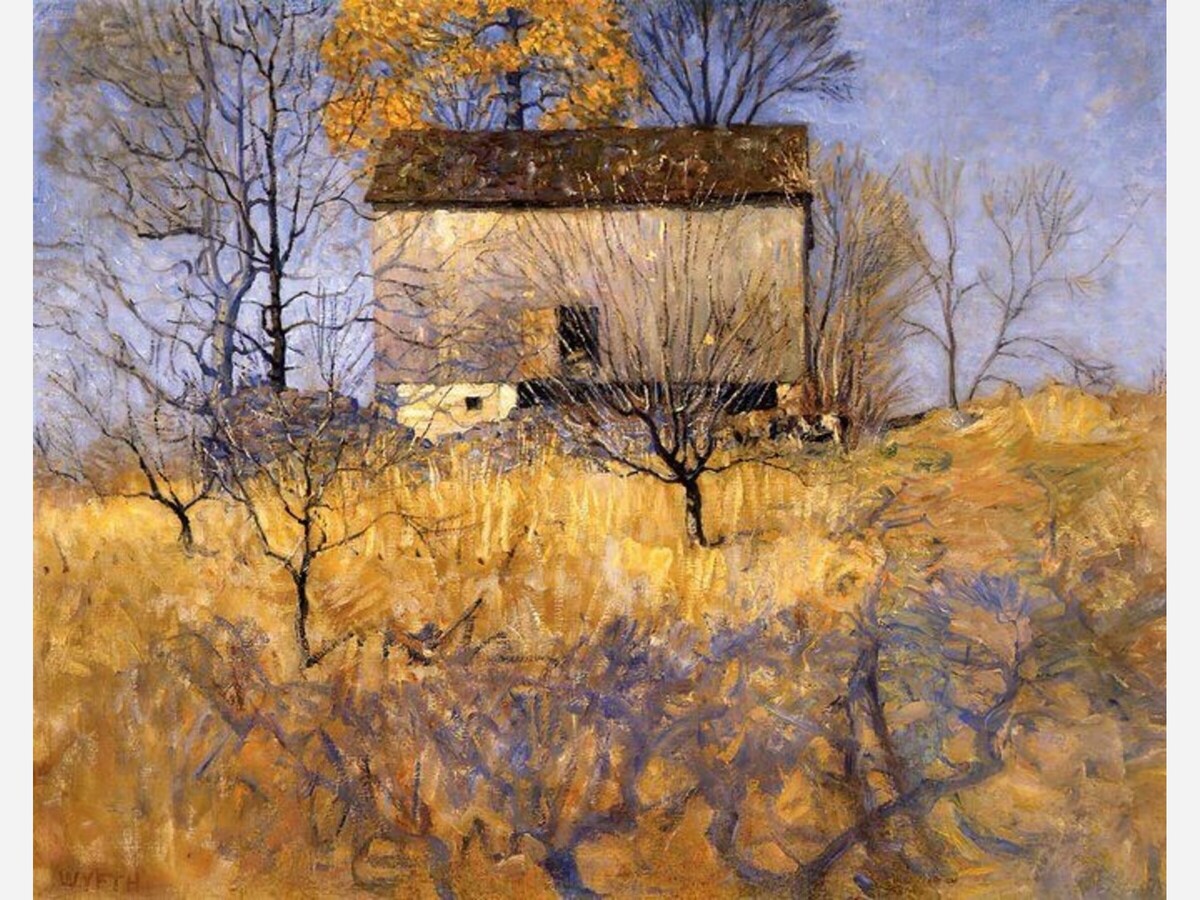Image

"A Brilliant Autumn Day" by N.C. Wyeth
by Craig Bennett*
Years ago I purchased and read a volume of correspondence by N.C. Wyeth, father of Andrew and a major American illustrator in the early years of the twentieth century. I was curious as to how a painter—an individual who depicted the world in shapes and colors—would describe that same world in words when he had the need to. I had read more than enough prose to have a pretty good idea of how writers would do so, but I couldn’t recall reading anything that had given me any solid idea of how a painter would.
I was pleasantly surprised by what I found. Not only were Wyeth’s descriptions of the scenes he painted—especially those around his long-time home in Chadds Ford, Pennsylvania—fresh, insightful, and delightfully original in ways that I had never encountered in the work of any of my favorite fiction writers, but the letters also revealed a deep love and reverence for the natural world, along with a strong awareness of the ravages of “progress” and the largely unacknowledged importance of what had been lost. More subtly apparent was a deepening wisdom that became increasingly impressive as the letters accumulated over the years.
Wyeth was a fascinating individual, as most highly creative people seem to be. Yet this doesn’t necessarily mean that he was all that nice a guy. Better than some, certainly, as far as his correspondence revealed. But he fought constantly for essentially his entire adult life against the constraints that economic imperatives placed upon his art and the expectations that society placed upon the artist as a family man, property owner, and citizen.
It seemed like a tragedy of the worst imaginable sort that he and his grandson (and namesake) were killed instantly when their vehicle was struck by a train just after they had stopped to watch some huskers in a neighborhood corn field. How could one fail to see and hear an oncoming steam locomotive in the quiet southeastern Pennsylvania countryside of those days? Since his hearing had deteriorated noticeably in recent years, how could he have been so thoughtless as to approach a railroad crossing in an automobile—especially in the company of his young grandson—without looking both ways to make certain that there was no train coming?
Was it in fact an accident? Had the artist’s inherently melancholy temperament, combined with his growing sense of nostalgia, his sadness over the inescapable beginnings of development in his own immediate home area, and perhaps a reluctance to see his grandson have to grow up in such circumstances moved him to some sudden, rash action that would relieve both of them of having to deal with a world in such rapid decline any longer? Apparently, no one will ever know for certain.
But I can relate to much of what he apparently had begun to feel regarding the gradually increasing encroachment of suburban development throughout the quiet, rural locality where he had chosen to live, work, and raise his family. In one of the letters contained in the collection mentioned above, he discourses at length on fireplaces. Of questionable value as sources of heat for anywhere but directly in front of them, they are nevertheless something of value and importance to human beings—so much so that they are frequently featured in many of the more expensive houses being built even today. But Wyeth had seen them already disappear from the blueprints of the more affordable houses in his own time.
And I’m sure that he must have been saddened by the realization that we often (too often) fail to recognize the importance of something until it’s gone. I’ve seen enough of this in my own lifetime to be saddened by the apparent disappearance of things like front porches, streets lined with shade trees, patches of woods and open meadows within the town or borough limits, stately older homes that were torn down to make room for something new, modern, unadorned, efficient… and entirely without character, if not downright ugly. Indeed, it is depressing. I doubt that such depression will drive me to such a rash and radical escape as the one that Wyeth took for the same possible reason, but I can imagine how he must have felt. Unfortunately, I can imagine how he must have felt.
* Craig H. Bennett, author of Nights on the Mountain and More Things in Heaven and Earth, available at amazon.com, barnesandnoble.com, and the Firefly bookstore, Kutztown, PA